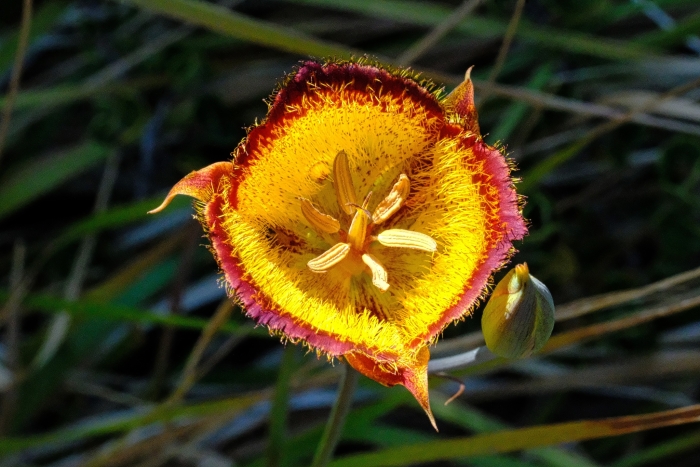Weed’s Mariposa Lily
(Calochortus weedii)
Weed’s Mariposa Lily (Calochortus weedii)
/
/

Madeleine Claire
CC BY 4.0
Image By:
Madeleine Claire
Recorded By:
Copyright:
CC BY 4.0
Copyright Notice:
Photo by: Madeleine Claire | License Type: CC BY 4.0 | License URL: http://creativecommons.org/licenses/by/4.0/ | Rights Holder: Madeleine Claire | Publisher: iNaturalist | Date Created: 2021-06-27T23:20:02Z |

























Estimated Native Range
Summary
Calochortus weedii, commonly known as Weed’s mariposa lily, is a perennial herb that is native to various ecological settings including chaparral, coastal sage scrub, and open oak woodlands in Southern California and Baja California. It is particularly found in the Outer Southern California Coast Ranges, the Transverse Ranges, and the Peninsular Ranges. This species is adapted to Mediterranean-type climates with wet winters and dry summers, and it typically grows in well-drained, sandy or rocky soils. Calochortus weedii reaches up to 3 feet in height, with a single basal leaf that withers by the time of blooming. The plant is noted for its showy flowers, which bloom in spring and exhibit a range of colors from cream to reddish-purple, often with reddish-brown borders and inner surface hairs that add to their ornamental value.
Weed’s mariposa lily is valued for its striking flowers, which make it a popular choice for native plant gardens, wildflower meadows, and as an accent in rock gardens. It requires little maintenance once established and is drought-tolerant, making it suitable for xeriscaping. In cultivation, it thrives in full sun to part shade and prefers well-drained soils. While generally disease-free, it can be susceptible to bulb rot if overwatered or planted in poorly draining soils. There are no widely known cultivars of this species, but its natural beauty makes it a standout without selective breeding.CC BY-SA 4.0
Weed’s mariposa lily is valued for its striking flowers, which make it a popular choice for native plant gardens, wildflower meadows, and as an accent in rock gardens. It requires little maintenance once established and is drought-tolerant, making it suitable for xeriscaping. In cultivation, it thrives in full sun to part shade and prefers well-drained soils. While generally disease-free, it can be susceptible to bulb rot if overwatered or planted in poorly draining soils. There are no widely known cultivars of this species, but its natural beauty makes it a standout without selective breeding.CC BY-SA 4.0
Plant Description
- Plant Type: Herb
- Height: 1-2 feet
- Width: 0.5-1 feet
- Growth Rate: Moderate
- Flower Color: Yellow
- Flowering Season: Spring, Summer
- Leaf Retention: Deciduous
Growth Requirements
- Sun: Full Sun, Part Shade
- Water: Low
- Drainage: Medium, Fast
Common Uses
Bee Garden, Butterfly Garden, Low Maintenance, Rock Garden
Natural Habitat
Native to chaparral, coastal sage scrub, and open oak woodlands
Other Names
Common Names: Mariposa Lily
Scientific Names: , Calochortus weedii, Calochortus luteus var. weedii, Cyclobothra weedii,
GBIF Accepted Name: